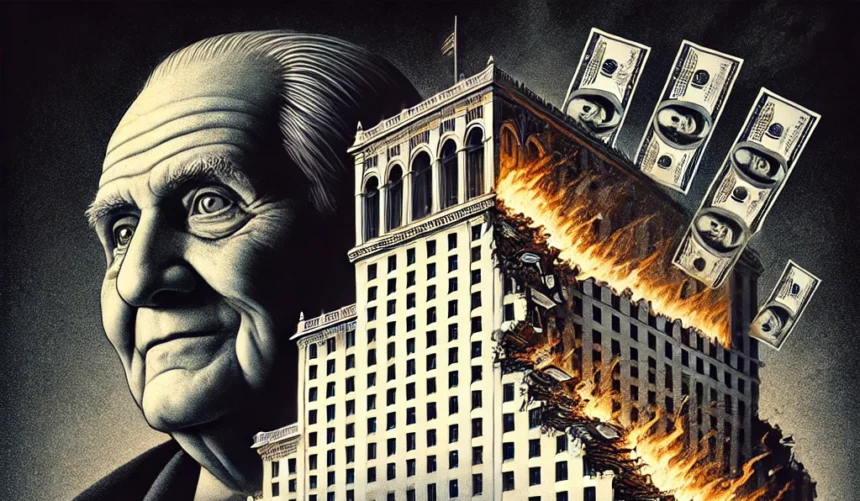The world of real estate investment is often riddled with stories of success and cautionary tales. One of the most striking examples of the latter is the downfall of Nicholas David Carlile, a once-celebrated figure in the “wealth creation” industry. With promises of high returns and “fuss-free” investments, Carlile’s ventures lured many unsuspecting investors into what turned out to be a financial nightmare. Ultimately, his bankruptcy, reportedly amounting to a staggering £21 million, served as a sobering reminder of the dangers of unregulated collective investment schemes (UCIS) and blind trust in so-called property gurus.
A Shady Legacy Begins: Platinum Portfolio Builder
Nicholas David Carlile first rose to prominence with his company, Platinum Portfolio Builder (PPB). This venture promised to simplify property investment for its clients, ostensibly offering a golden opportunity for those looking to grow their wealth. However, the reality was far from the polished image Carlile projected. Many of his clients experienced significant losses, as PPB’s promises of wealth creation turned out to be built on shaky foundations.
PPB’s failure was only the beginning of Carlile’s controversial career. Despite the fallout, Carlile’s appetite for risk and unregulated investments did not wane. Instead, he transitioned into even riskier ventures, ultimately leading to his partnership with Shepherd Cox and a series of ill-fated hotel room investment schemes.

The Hotel Room Investment Debacle
Carlile’s collaboration with Shepherd Cox marked a new chapter in his career, one that would prove disastrous for both himself and his investors. Together, they purchased old, dilapidated hotels under the guise of refurbishing them into lucrative properties. These refurbished hotels would then be divided into leasehold rooms, which were sold to investors with the promise of high returns.
At first glance, the scheme appeared to be a win-win. Investors were drawn in by the allure of passive income from their leasehold rooms, while Carlile and his partners stood to profit handsomely from the sales. However, the reality was starkly different. The refurbishment projects rarely, if ever, materialized. Investors who had placed their trust and savings in Carlile’s promises found themselves saddled with worthless investments in properties that remained derelict.
The Warning Signs Before the Collapse
Even before the COVID-19 pandemic exacerbated the situation, concerns about Carlile’s schemes had begun to surface. Investors and industry insiders alike questioned the feasibility and legitimacy of his ventures. Yet, despite these red flags, many continued to pour their money into his projects, lured by the prospect of high returns and reassurances from Carlile himself.
One such individual, Peter J. How, recounted his interactions with Carlile on an online forum. According to How, Carlile’s ventures appeared risky from the outset. “I knew Nick as a local investor,” How wrote. “As I was doing things myself, it never made sense for me to join up with him. I know he then hit into selling hotel rooms, which I thought was too risky. Glad I kept clear.”
How’s decision to avoid Carlile’s schemes proved prudent. Others were not so fortunate. By the time the pandemic struck, the cracks in Carlile’s empire had widened into chasms, and the entire operation began to crumble.
A Personal Bankruptcy of £21 Million
In the summer of 2021, Nicholas David Carlile was officially declared bankrupt, with debts reportedly amounting to £21 million. The bankruptcy order marked the culmination of years of financial mismanagement and dubious business practices. It also left countless investors in distress, many of whom had lent money to Carlile personally, trusting his claims of expertise and success.
The scale of the financial devastation was staggering. Carlile’s bankruptcy was not just a personal failure but a cautionary tale for an industry that often operates in the shadows of regulation. His downfall mirrored that of Glenn Armstrong, another self-proclaimed property guru who similarly left a trail of financial ruin in his wake.
The Human Cost of Empty Promises
For the investors who placed their faith in Carlile, the consequences were devastating. Many had invested their life savings into his schemes, only to see their dreams of financial security vanish. The promise of passive income turned into a nightmare of legal battles, debt, and lost opportunities.
The emotional toll on these investors cannot be overstated. Stories abound of individuals who were left destitute, their trust shattered by Carlile’s unfulfilled promises. One investor shared how they had hoped to fund their retirement through the income from the hotel room investments, only to find themselves forced to delay retirement indefinitely and re-enter the workforce.
Another victim described the psychological impact of the ordeal, highlighting feelings of shame and betrayal. “You trust someone who presents themselves as an expert, and you end up losing everything,” they said. “It’s not just about the money. It’s about the trust that was broken.”
The Ripple Effect: Families and Communities Impacted
The impact of Carlile’s schemes extended beyond individual investors. Families were torn apart as financial stress took its toll on relationships. Communities that had hoped for revitalization through the promised hotel refurbishments were left with derelict buildings that became eyesores and symbols of broken promises.
Local economies also suffered. The failure to refurbish and reopen the hotels meant lost opportunities for job creation and tourism revenue. In some cases, the abandoned properties became magnets for vandalism and crime, further exacerbating the negative impact on surrounding areas.
Lessons Learned: The Dangers of Unregulated Investments
The rise and fall of Nicholas David Carlile underscore the risks associated with unregulated collective investment schemes. Such schemes often operate outside the purview of financial regulators, leaving investors with little recourse when things go wrong. In Carlile’s case, the lack of oversight allowed him to perpetuate his schemes for years, even as concerns about their legitimacy mounted.
Potential investors must take heed of the lessons from Carlile’s downfall. High returns and “fuss-free” investments often come with hidden risks, and promises that seem too good to be true usually are. Conducting thorough due diligence, seeking independent advice, and avoiding unregulated schemes are essential steps for anyone looking to safeguard their financial future.
The Industry’s Responsibility
While Carlile’s actions are undoubtedly reprehensible, his story also highlights systemic issues within the property investment industry. The lack of regulation and oversight creates an environment where unscrupulous individuals can thrive, preying on the hopes and dreams of unsuspecting investors.
To prevent future cases like Carlile’s, industry stakeholders must advocate for greater transparency and accountability. Regulators must step up their efforts to crack down on unregulated schemes and hold those who promote them accountable. Meanwhile, investors must educate themselves about the risks and avoid falling prey to the allure of easy money.
Moving Forward: Rebuilding Trust in Property Investment
Rebuilding trust in the property investment sector will require a concerted effort from all stakeholders. Industry leaders must work to promote ethical practices and provide better education for investors. Governments and regulators must implement stricter guidelines and ensure robust enforcement to deter fraudulent schemes.
For investors, the key takeaway is the importance of vigilance. Avoiding unregulated schemes, conducting thorough research, and seeking advice from trusted financial professionals can go a long way in protecting one’s assets. Learning from the mistakes of others, such as those who fell victim to Carlile’s schemes, is an invaluable step toward making informed investment decisions.
A Cautionary Tale for Aspiring Investors
Nicholas David Carlile’s story is a tragic cautionary tale, a stark reminder of the dangers of blind trust and unchecked ambition. His £21 million bankruptcy is not just a testament to his personal failings but a reflection of the systemic issues plaguing the property investment industry.
For those who aspire to grow their wealth through property investment, Carlile’s downfall serves as a sobering lesson. Trust must be earned, not blindly given. Promises of high returns must be scrutinized, not accepted at face value. And most importantly, due diligence is not just a recommendation but a necessity.
As the dust settles on Carlile’s empire of false promises, one can only hope that his story serves as a wake-up call for investors and regulators alike. The cost of ignoring these lessons is simply too high. By learning from the past, the industry can move toward a future where trust, transparency, and accountability are the cornerstones of success.







